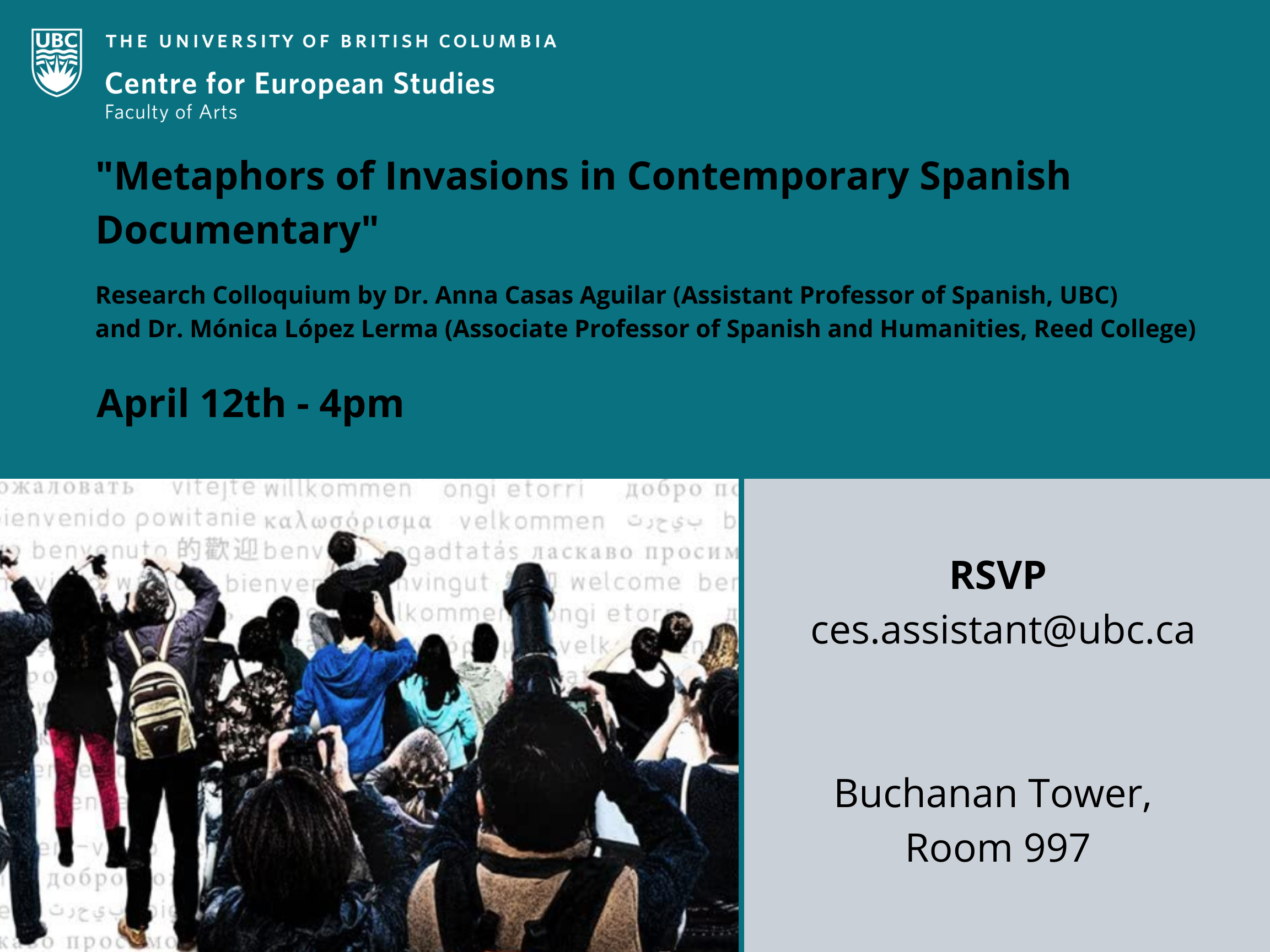Tuesday April 12 at 4:00 pm PT.
Dr. Anna Casas Aguilar and Dr. Mónica López Lerma
Please RSVP to ces.assistant@ubc.ca for in person attendance.
Location of the talk is here, Buchanan Tower, Room 997, 1873 East Mall, Vancouver, BC | V6T 1Z1
Metaphors of Invasions in Contemporary Spanish Documentary Research Colloquium by Dr. Anna Casas Aguilar and Dr. Mónica López Lerma

Abstracts:
“The Termite Metaphor: Documenting Systemic Corruption and Ruination” by Mònica López
Xavier Artigas and Xapo Ortega’s 2014 documentary “Termitas: El Observatorio DESC contra Bárcenas” uses the metaphor of termites to denounce the systemic corruption that plagues contemporary democratic Spain. Like a plague of termites, systemic corruption is portrayed as a highly organized and damaging system that operates underground and is difficult to detect. Drawing on the works of Ann Laura Stoler and Rob Nixon, this talk aims to unpack the insights, underlying assumptions, affective and material dimensions, limits, and implications of the use of the termite metaphor for understanding systemic corruption and theresponses to it. It argues that while the metaphor gives form to the elusive but destructive power of corruption, it fails to capture the documentary’s political message. The talk concludes by suggesting that in order to understand systemic corruption we need tomove beyond the metaphor of the termite and focus instead on the processes of ruination that the structures themselves produce.
“Zombie Chase: Documenting Barcelona’s Tourists” by Anna Casas Aguilar
My presentation explores a series visual documentary projects that present tourists in Barcelona as an annoying crowd ofundefined persons, renewing an ambivalence towards tourism that in Spain started in the 60s but that now has a different tone,one attuned with globalization, and with social equity issues in relation to spaces. I examine a series of documentaries: “TrentaMinuts: Conviure amb el turisme [Thirty Minutes: Coexisting with Tourism]” (Regàs i Pigrau, 2013), “Bye, bye Barcelona” (EduardoChibás Fernández, 2014) and “La ciutat dels turistes [The City of Tourists]” (2017) in order to prove that tourists in Barcelona have been portrayed in the lasts ten years in public media as zombies, as a dangerous, problematic mob. In these documentaries,tourists are presented as a silent, invasive group that is slowly but firmly taking over Barcelona. I am particularly interested in how word and image function in these films, as there are tensions about how tourists are portrayed and how they are spoken about:despite the fact that these three documentaries repeat several times that “tourists” are not the problem, but that the responsible are the politics around tourism carried out by the city and private sectors, visually speaking tourists do appear as the visible face of a bother and as those who cause distress.
Bio:
 Anna Casas Aguilar is an Associate Professor of Spanish at UBC. She holds a B.A. in Spanish and Latin American literature (Filología Hispánica) and a D.E.A. (Diploma de Estudios Avanzados) in Romance Literatures from the University of Barcelona. In 2013, she completed her Ph.D. in the Department of Spanish and Portuguese at the University of Toronto. Her teaching and research focuses on gender and cultural studies in contemporary Spain, with a particular interest in literature, cinema and photography. She is the Author of “Bilingual Legacies: Father Figures in Self-Writing from Barcelona” (University of Toronto Press, 2022) which examines how authors who grew up during Francisco Franco’s dictatorship confronted and reconstituted the regime’s model of fatherhood and masculinity.
Anna Casas Aguilar is an Associate Professor of Spanish at UBC. She holds a B.A. in Spanish and Latin American literature (Filología Hispánica) and a D.E.A. (Diploma de Estudios Avanzados) in Romance Literatures from the University of Barcelona. In 2013, she completed her Ph.D. in the Department of Spanish and Portuguese at the University of Toronto. Her teaching and research focuses on gender and cultural studies in contemporary Spain, with a particular interest in literature, cinema and photography. She is the Author of “Bilingual Legacies: Father Figures in Self-Writing from Barcelona” (University of Toronto Press, 2022) which examines how authors who grew up during Francisco Franco’s dictatorship confronted and reconstituted the regime’s model of fatherhood and masculinity.
 Mónica López Lerma is an Associate Professor of Spanish and Humanities at Reed College. She received a PhD in Comparative Literature and a Graduate Certificate in Film Studies from the University of Michigan. She also holds a Law degree from the University of Valencia (Spain) and a LL.M. in Jurisprudence from the European Academy of Legal Theory (Belgium). Mónica López Lerma is the author of “Sensing Justice through Contemporary Spanish Cinema: Aesthetics, Politics, Law” (Edinburgh University Press, 2021) and the co-editor of “Rancière and Law” (Routledge, 2018). She is currently working on a new book project tentatively titled “Documentaries Against the Law: Evidence, Affect, and Reflexivity” and editing a book entitled “Espacios y límites de la (in)justicia en la España contemporánea“.
Mónica López Lerma is an Associate Professor of Spanish and Humanities at Reed College. She received a PhD in Comparative Literature and a Graduate Certificate in Film Studies from the University of Michigan. She also holds a Law degree from the University of Valencia (Spain) and a LL.M. in Jurisprudence from the European Academy of Legal Theory (Belgium). Mónica López Lerma is the author of “Sensing Justice through Contemporary Spanish Cinema: Aesthetics, Politics, Law” (Edinburgh University Press, 2021) and the co-editor of “Rancière and Law” (Routledge, 2018). She is currently working on a new book project tentatively titled “Documentaries Against the Law: Evidence, Affect, and Reflexivity” and editing a book entitled “Espacios y límites de la (in)justicia en la España contemporánea“.